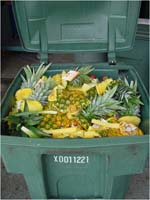Food Waste Management
go.ncsu.edu/readext?425185
en Español / em Português
El inglés es el idioma de control de esta página. En la medida en que haya algún conflicto entre la traducción al inglés y la traducción, el inglés prevalece.
Al hacer clic en el enlace de traducción se activa un servicio de traducción gratuito para convertir la página al español. Al igual que con cualquier traducción por Internet, la conversión no es sensible al contexto y puede que no traduzca el texto en su significado original. NC State Extension no garantiza la exactitud del texto traducido. Por favor, tenga en cuenta que algunas aplicaciones y/o servicios pueden no funcionar como se espera cuando se traducen.
Português
Inglês é o idioma de controle desta página. Na medida que haja algum conflito entre o texto original em Inglês e a tradução, o Inglês prevalece.
Ao clicar no link de tradução, um serviço gratuito de tradução será ativado para converter a página para o Português. Como em qualquer tradução pela internet, a conversão não é sensivel ao contexto e pode não ocorrer a tradução para o significado orginal. O serviço de Extensão da Carolina do Norte (NC State Extension) não garante a exatidão do texto traduzido. Por favor, observe que algumas funções ou serviços podem não funcionar como esperado após a tradução.
English
English is the controlling language of this page. To the extent there is any conflict between the English text and the translation, English controls.
Clicking on the translation link activates a free translation service to convert the page to Spanish. As with any Internet translation, the conversion is not context-sensitive and may not translate the text to its original meaning. NC State Extension does not guarantee the accuracy of the translated text. Please note that some applications and/or services may not function as expected when translated.
Collapse ▲Why compost food scraps?
Every day, households, schools, institutions, and businesses throw leftover table scraps and food preparation waste into the garbage. The garbage must be picked up and transported to a disposal facility–at significant financial and environmental cost. Through composting or vermicomposting, food scraps are transformed into a nutrient-rich soil amendment for plants and gardens.
How are food scraps composted?
 Composting is the aerobic decomposition of organic materials by micoorganisms under controlled conditions into a soil-like substance called compost. During composting, microorganisms such as bacteria and fungi break down complex organic compounds into simpler substances and produce carbon dioxide, water, minerals, and stabilized organic matter (compost). The process produces heat, which can destroy pathogens (disease-causing microorganisms) and weed seeds.
Composting is the aerobic decomposition of organic materials by micoorganisms under controlled conditions into a soil-like substance called compost. During composting, microorganisms such as bacteria and fungi break down complex organic compounds into simpler substances and produce carbon dioxide, water, minerals, and stabilized organic matter (compost). The process produces heat, which can destroy pathogens (disease-causing microorganisms) and weed seeds.
Are there any kinds of food scraps that should not be composted?
At home, don’t put meat, fish, dairy products, grease, oil, or bones in your compost bin. Cover kitchen scraps or vegetable garden trimmings with brown leaves or other carbon materials. Large-scale composting facilities are able to compost all of these materials (with the proper permits).
Tools Needed to Get Started
Learn how to compost at home. Businesses, institutions, and farms may read about large-scale composting for more information.
Publications and Internet Resources
Horticulture Publications
- Worms Can Recycle Your Garbage (Rhonda Sherman, AG-473-18, N.C. Cooperative Extension Service, 2017-rev., 5 p.)
- Backyard Composting of Yard, Garden, and Food Discards (Rhonda Sherman, AG-791, N.C. Cooperative Extension Service, 2017, 6 p.)
- Resource and Waste Recovery
Internet Resources
- NC Composting Council
- US Composting Council
- NC DEQ Division of Environmental Assistance and Outreach
- EPA Food Recovery Challenge
- Biocycle: Advancing Composting, Organics Recycling & Renewable Energy
- Composting Council of Canada
- Cornell Waste Management Institute
- “Food Waste” U.S. EPA. Website
- Feeding Animals Food Discards
- Compost Exchange
- National Renderers Association


